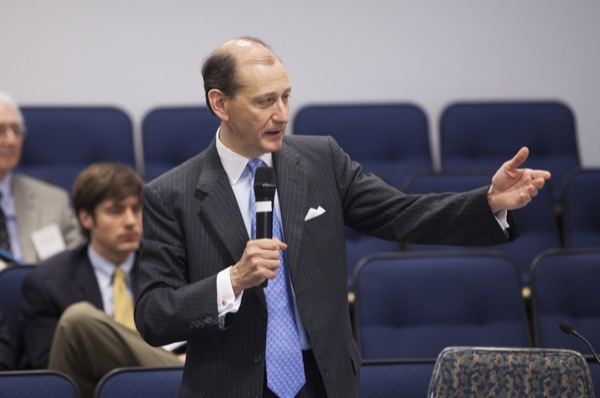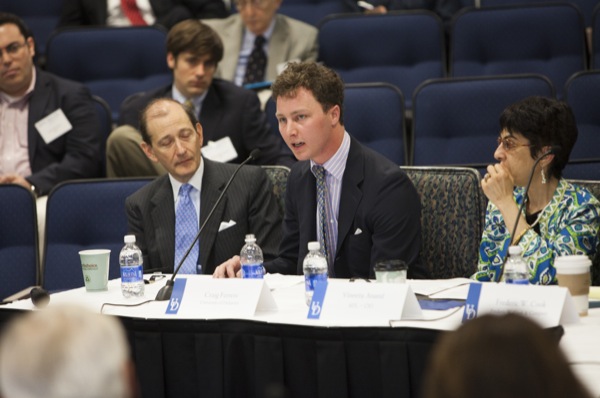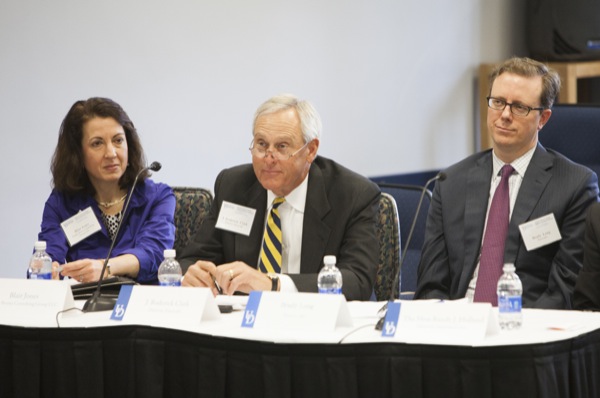


Peer groups and pay
Weinberg Center panel discusses role of peer groups in determining executive pay
4:28 p.m., April 23, 2013--Peer groups might be the way major corporations attempt to ensure their executives’ pay “keeps up with the Joneses” but ongoing research by the University of Delaware’s Charles Elson and Craig Ferrere suggests an overreliance on peer group compensation benchmarking is central to the persistent issue of rising executive pay.
At a panel “Deemphasizing Peer Groups -- What’s Next?” held last week on UD’s Laird Campus, Ferrere, a 2011 UD graduate and recipient of the first Edgar Woolard Fellowship that spring, pointed out data that showed executives rarely leave to work for other companies.
Campus Stories
From graduates, faculty
Doctoral hooding
“We looked at data on the CEOs from 1,500 companies over the last 20 years and in the entire database there were only 27 turnovers where CEOs were identified as moving from one company to another,” said Ferrere.
One of the greatest flaws of using peer groups then, said Elson, Edgar S. Woolard Jr. Chair in Corporate Governance, is the inherent reasoning that emphasizes this transferability of talent.
“If executive talent is not transferable then the whole theoretic notion of the peer group collapses,” said Elson, who is also director of the John L. Weinberg Center for Corporate Governance. “The view is that CEOs can move somewhere else and there is a market for their talent, which is why we compare them, but it turns out when you become CEO that’s not necessarily true. Yes, there is movement for lower ranking officers but movement by the CEO position is very unique.”
Citing JCPenney’s recent management issues, Elson pointed out that CEOs do bring a number of skills to the table but those skills are not always transferable and do not equate to success in another company.
Ferrere also explained that separating the pay scheme of the CEO from everyone else in the organization can create problems internally.
“Two separate systems where a CEO is paid based on peers outside the company will create a disconnect over time within the organization and can act as a disincentive.”
Instead, Elson and Ferrere recommend an internal model that deemphasizes the use of the peer group and focuses on internal performance metrics and the context of the organization.
While some panelists countered that peer groups are here to stay, many agreed that finding a better balance could help address the issue of inflated executive pay.
“I won’t dispute the concern of the overreliance on peer group data,” said Brady K. Long, vice president and general counsel, Ensco PLC. “It has to be part of a mosaic of a larger analysis the comp committee and the shareholders evaluate when they make or endorse a comp decision.”
That mosaic, said Long, should also have clarity between the employment contract and performance.
Blair Jones, managing principal, Semler Brossy Consulting Group LLC, pointed out recognition for those who break the mold and make efforts to keep pay performance based could help.
She gave an example of one of her clients whose management team had chosen over the years to be paid at the 25th percentile for cultural reasons.
“The board was uncomfortable with that decision because they felt it sent a message to the rest of the management team that ‘we’re not willing to pay’ and they think thought that put them at risk,” said Jones. “Perhaps if the management team had been recognized for making that call it would have created a different outcome.”
Randy J. Holland, Delaware Supreme Court justice, said the issues surrounding executive compensation have been debated for decades, evolving from shareholder claims in court of directors not meeting fiduciary responsibilities to today’s “say-on-pay.”
“The contribution the paper makes to the discussion is the observation that there has been a disproportionate influence by looking externally with peer groups rather than looking internally,” said Holland. “I see little disagreement with the principle in the paper that the use of peer groups should be reconsidered or refocused – as many have said peer groups are here to stay – but maybe we should examine the composition of peer groups.”
“All have said peer groups are not the dispositive decision maker, that boards are not advocating what they’re doing,” said Holland. “The paper’s position is they may just be paying a disproportionate influence to peer groups. To that extent the paper has really engaged discussion and moved away from courts, legislatures and regulatory authorities and basically said let’s focus on how we set compensation in the first place. I think it will be interesting to see how the discussion continues.”
About the research
Elson and Ferrere’s research began with the study, “Executive Superstars, Peer Groups and Over-Compensation — Cause, Effect and Solution.”
They presented their findings last May at another panel hosted by the Weinberg Center and since that time their research has stirred conversations nationally in news and practitioner outlets from The New York Times to Financial News. The research, which was funded by the Investor Responsibility Research Center Institute (IRRCi), was also accepted for publication in the Journal of Corporate Law.
The pair has presented their research across the United States from Delaware to California and will address the American Bar Association later this year.
Article by Kathryn Meier
Photos by Ambre Alexander










